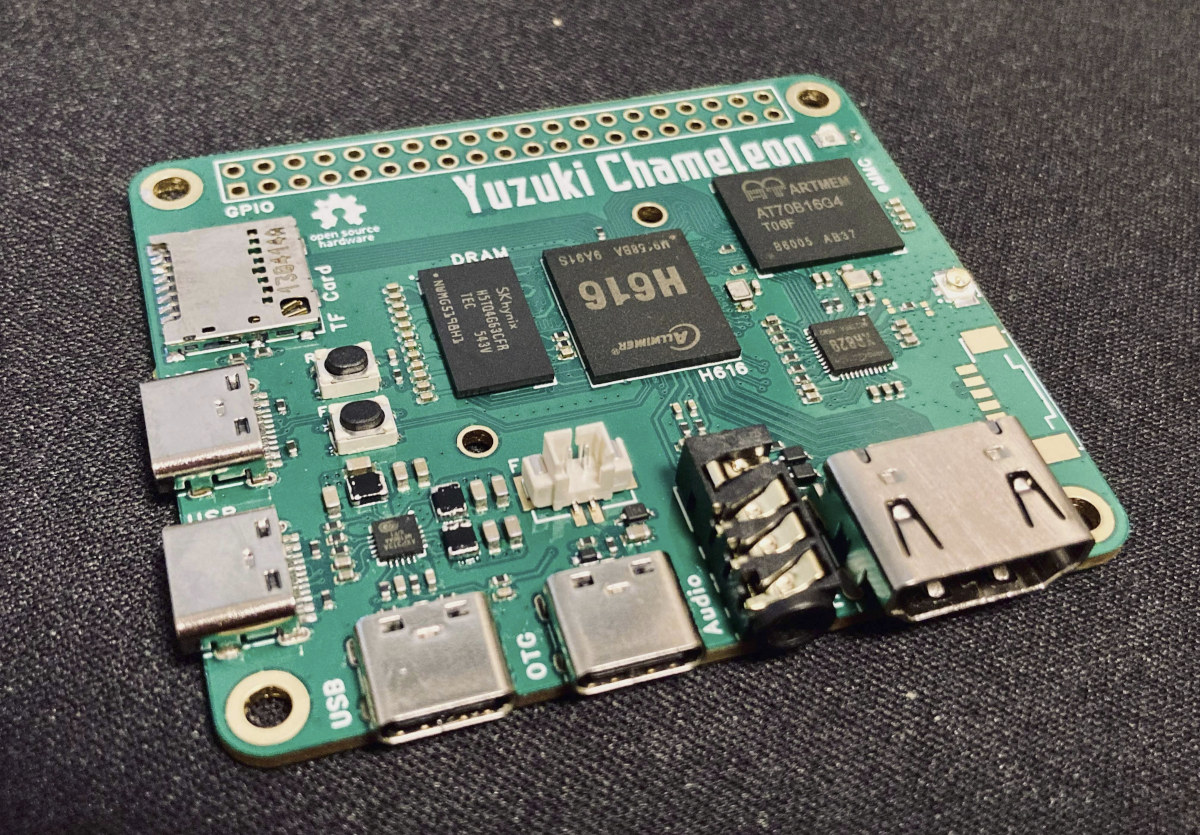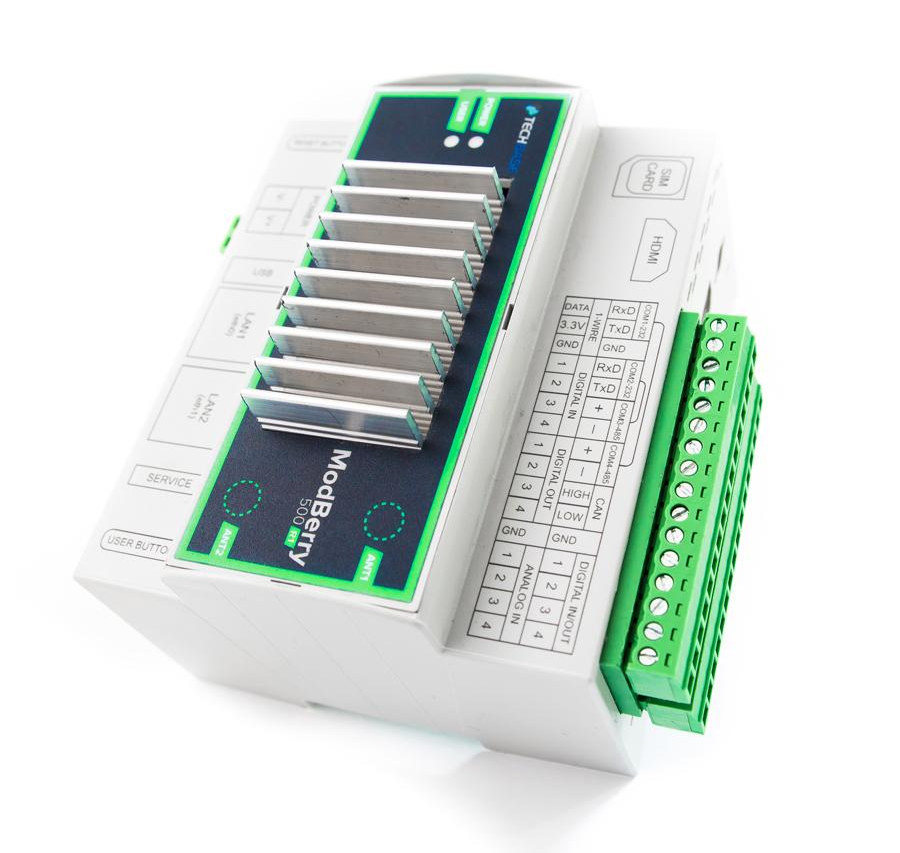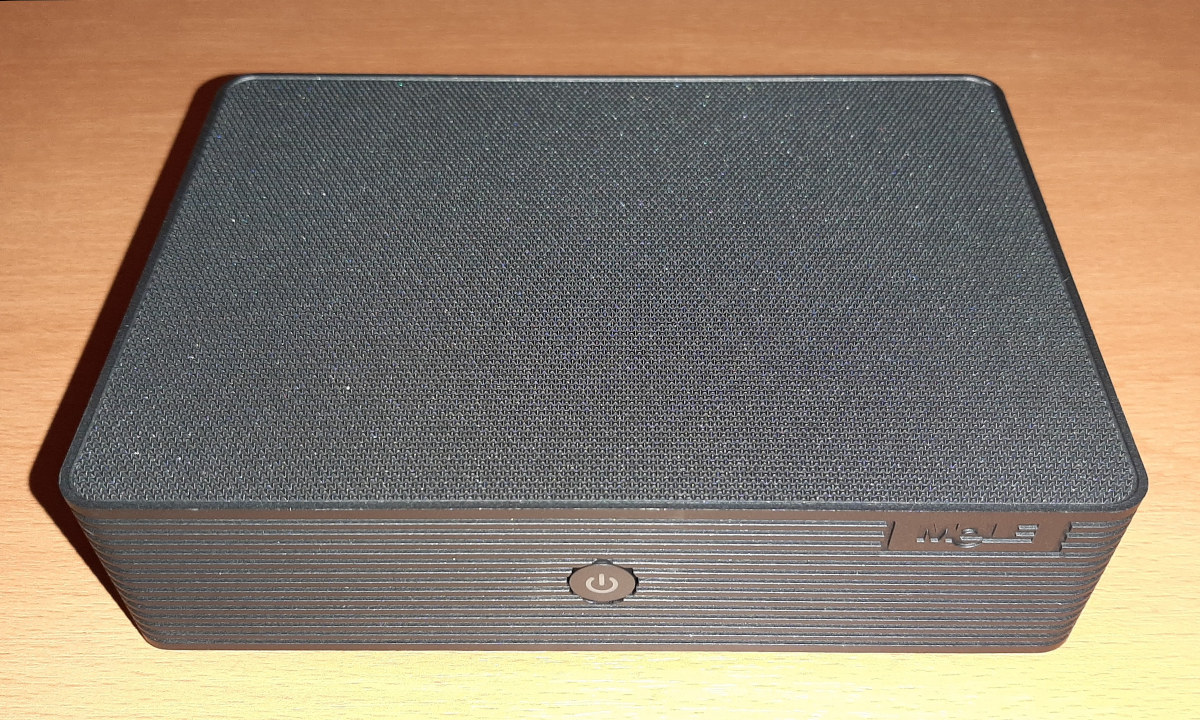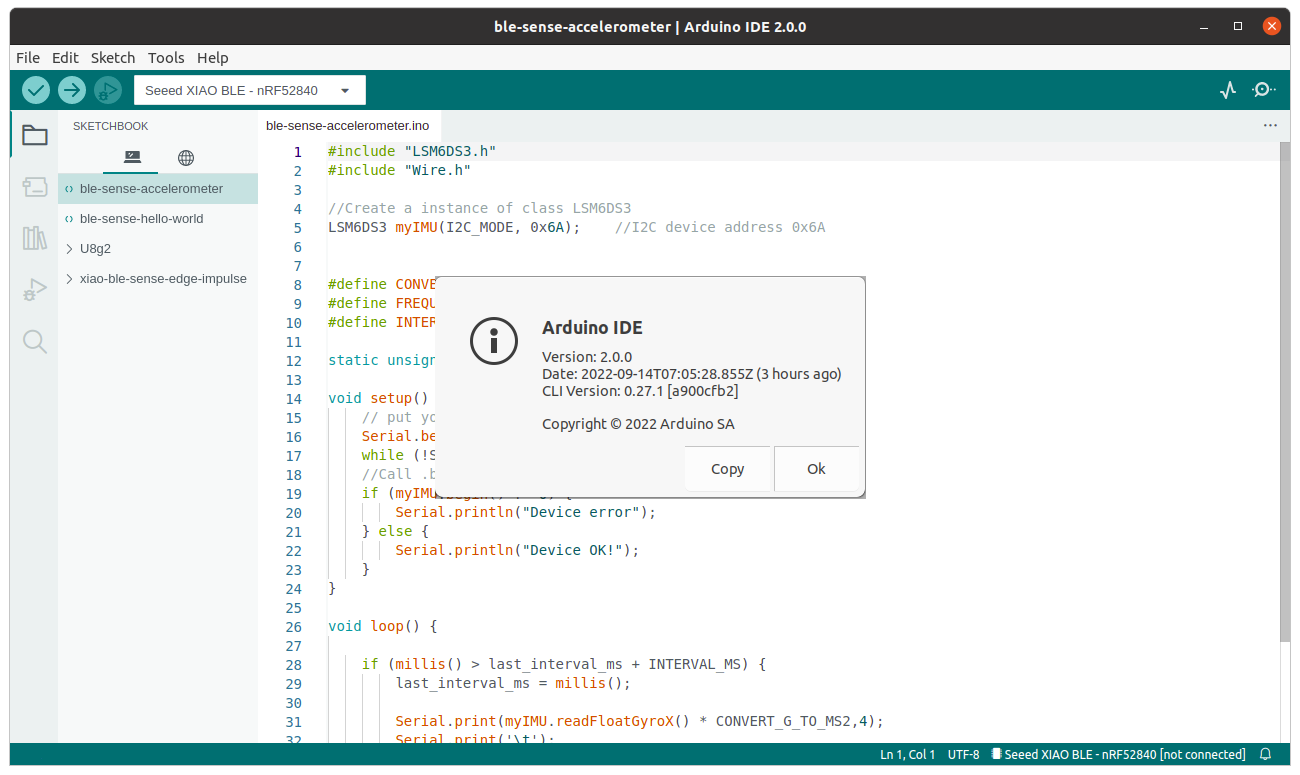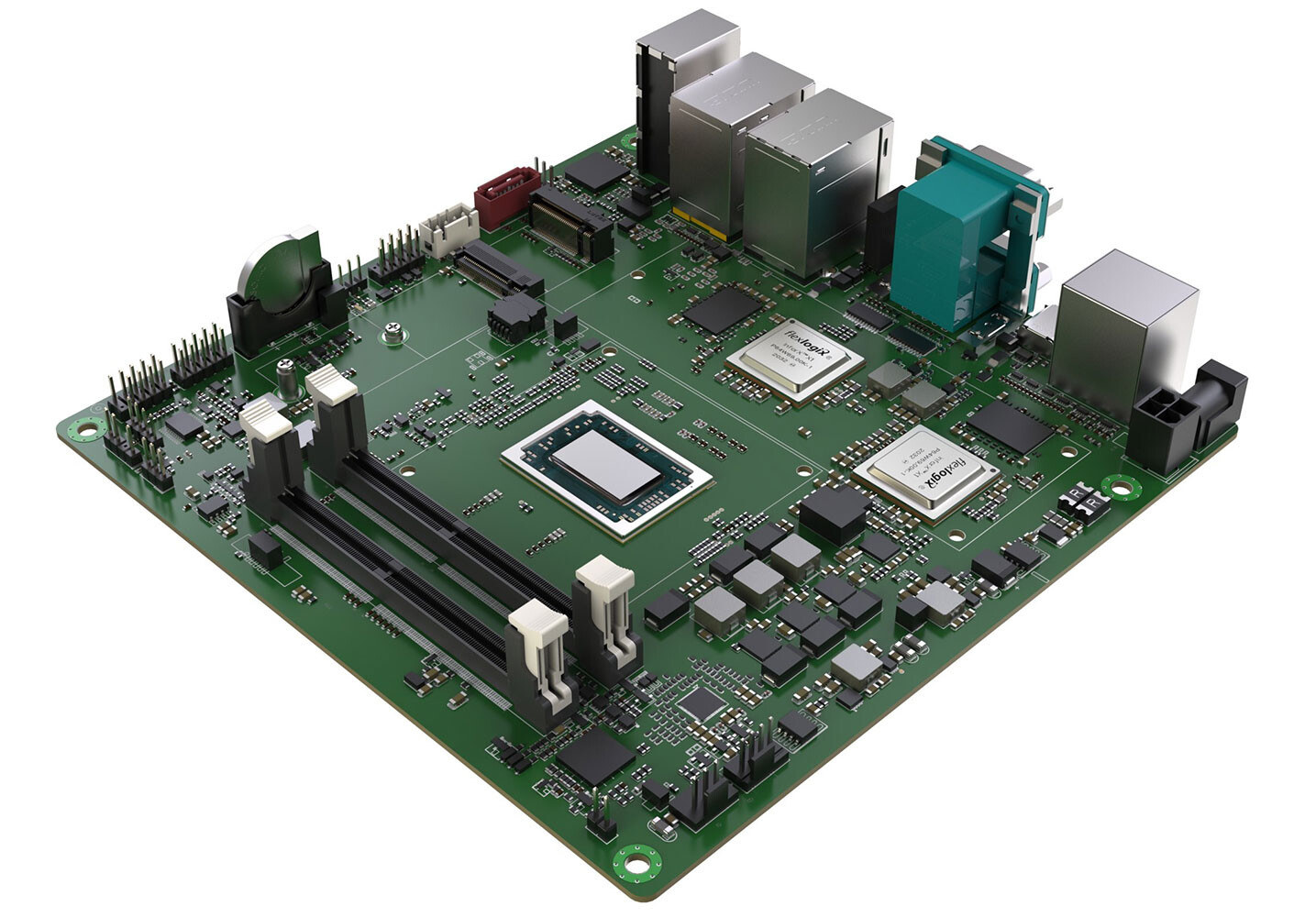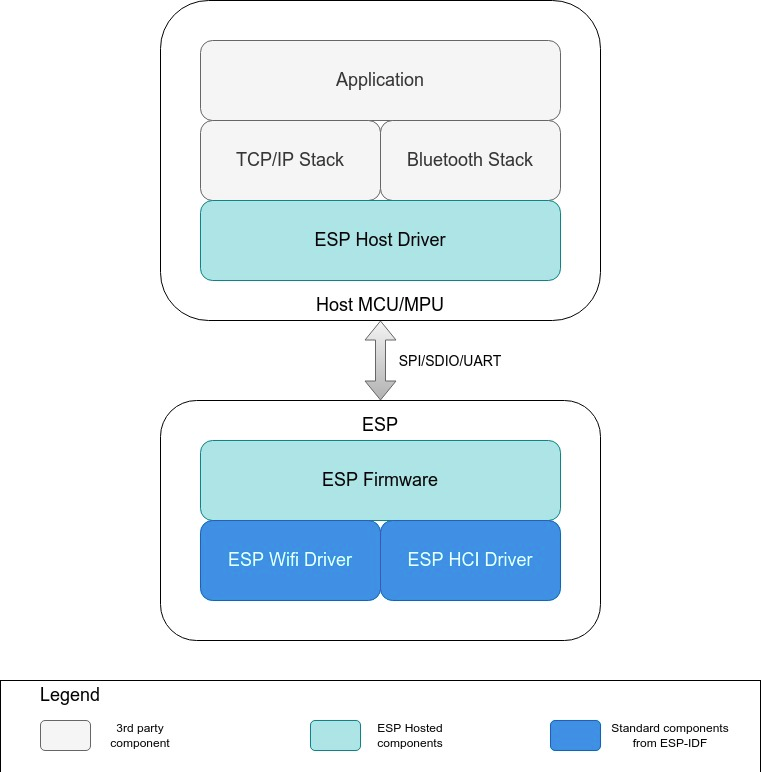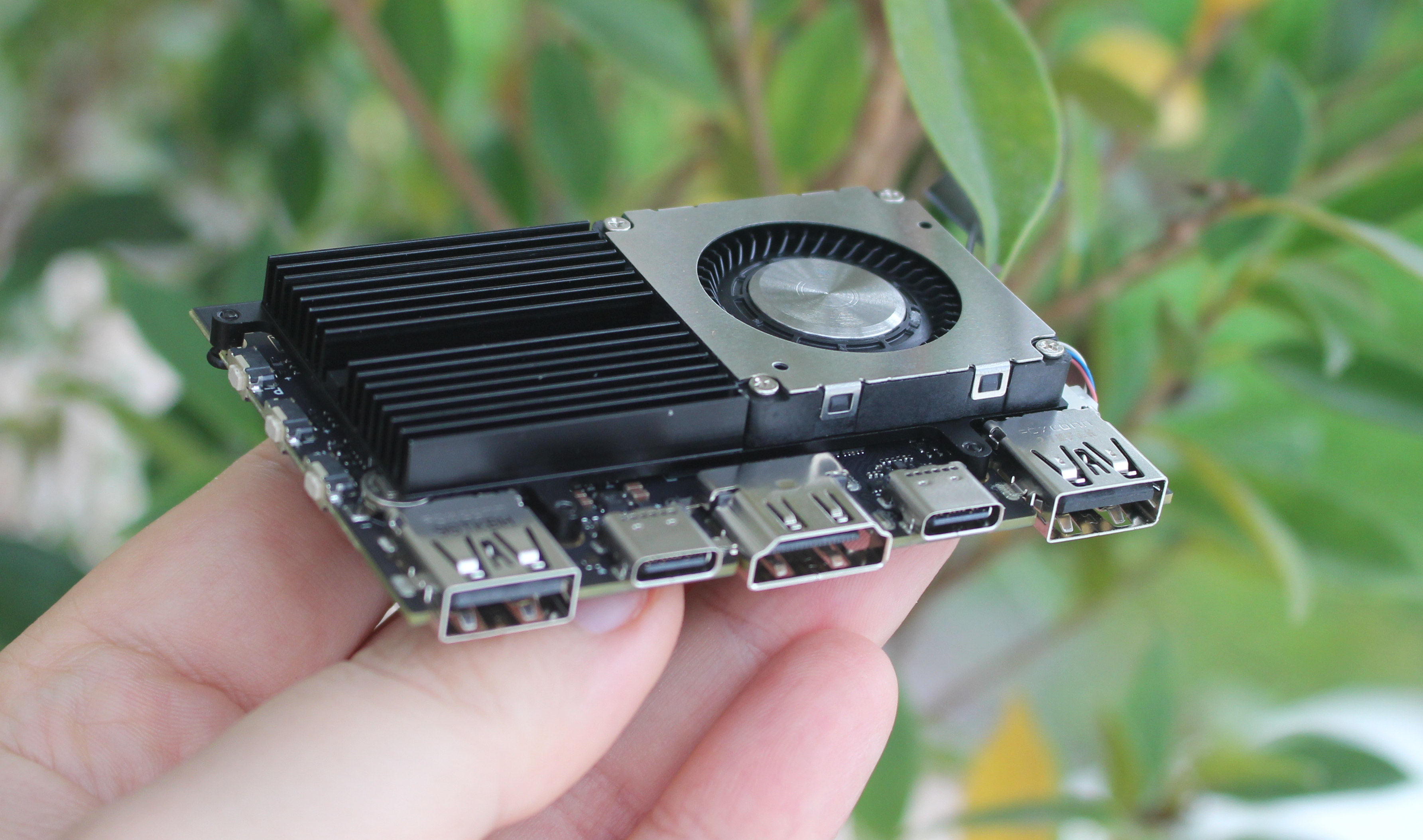Luxonis OAK-D Series 2 are the second-generation of USB or PoE cameras with 3D depth and a built-in AI accelerator mostly used for computer vision in robotics applications. We first wrote about Luxonis’ DepthAI module for Raspberry Pi based on the Intel Myriad X AI accelerator in 2019, and later found the module integrated into OpenCV AI Kit Lite, aka OAK-D Lite camera. The second-generation OAK-D cameras replace the module with a Robotics Vision Core 2 (RVC2) “chip-down design” equipped an SoC and Myriad X AI accelerator for up to 4 TOPS of processing power, including 1.4 TOPS for AI inference. Luxonis OAK-D Series 2 specifications and features: Robotics Vision Core 2 based on Myriad X AI accelerator 4 TOPS of processing power (1.4 TOPS for AI) Video encoding – H.264, H.265, MJPEG @ 4Kp3, 1080p60 Computer vision – Warp/dewarp, resize, crop via ImageManip node, edge detection, feature tracking, custom […]
Yuzuki Chameleon – A Raspberry Pi Model A shaped SBC with Allwinner H616 CPU
Yuzuki Chameleon is an open-source hardware single board computer powered by an Allwinner H616 quad-core Cortex-A53 processor that somewhat follows the shape of Raspberry Pi 3 Model A+ SBC with a different port layout that should still keep mechanical and electrical compatibility with some Raspberry Pi HATs. The board supports up to 2GB RAM, up to 128GB eMMC flash, features a MicroSD card slot, one 4K-capable HDMI 2.0 port, an audio jack, four USB Type-C ports to keep the design as slim as possible, as well as a wireless module for WiFi and Bluetooth and a connector to optionally add Fast Ethernet through an external module. Yuzuki Chameleon specifications: SoC – Allwinner H616 quad-core Cortex-A53 processor @ with Arm Mali G31 GPU, 6Kp30/4Kp60 video decoder System Memory – Up to 2GB RAM Storage – Up to 128GB eMMC flash storage, MicroSD card socket Video Output – HDMI 2.0 up to […]
ModBerry 500 R1 industrial computer replaces Raspberry Pi CM4 with Radxa CM3 module
The ModBerry 500 R1 industrial computer features a Radxa CM3 system-on-module that follows the Raspberry Pi CM4 form factor, but is powered by a Rockchip RK3566 quad-core Cortex-A55 processor instead. The ModBerry 500 CM4 DIN-rail industrial computer with a Raspberry Pi Compute Module 4 was launched in 2020, but the Raspberry Pi shortage got in the way, even for commercial customers, and Poland-based TECHBASE had to find an alternative to Raspberry Pi CM4 to offer shorter lead times to its customers, and so the ModBerry 500 R1 based on Radxa CM3 system-on-module was born. ModBerry 500 R1 specifications: SoM – Radxa CM3 module with Rockchip RK3566 quad-core Cortex-A55 processor @ up to 2.0 GHz, with 1 to 8GB LPDDR4 RAM, up to 4 to 128GB eMMC flash (up to 250 MB/s), optional Wi-Fi 5 & Bluetooth 5.0 module Storage – Optional NVMe SSD via PCIe 2.0 (mini PCIe (default) or […]
MeLE Quieter HD3Q Review – A fanless mini PC with dual-channel memory, 2.5-inch SATA bay
MeLE has launched a new range of passive mini PCs known as the ‘Quieter HD Series’ and first in the lineup is the Quieter HD3Q. Not only does this new mini PC address the main criticism of their earlier models by now including dual-channel memory, but it is also slightly larger allowing the ability to add a 2.5” SATA drive, and also has a higher power limit to improve performance. MeLE kindly sent one for review and I’ve looked at performance running both Windows and Ubuntu. MeLE Quieter HD3Q hardware overview The MeLE Quieter HD3Q consists of a 150 x 105 x 37mm (5.91 x 4.13 x 1.46 inches) rectangular plastic case with a metal base plate. Gone are the faux heat spreader fins from the top of the case as it is now finished with a very fine dimple effect. As a passively cooled mini PC, it uses Intel’s […]
Arduino IDE 2.0 is now officially released
The first stable release of Arduino IDE 2.0 is now out. Based on the Eclipse Theia framework, the new IDE provides a more modern and user-friendly user interface, faster compilation time, and more features we’ll discuss in this post. Arduino initially introduced the Arduino IDE 2.0 beta in March 2021 with a live debugger with breakpoints support, a revamped user interface with features such as autocompletion of variables and functions. After 18 months of debugging with the help of members of the community such as Paul Stoffregen (the maker of the Teensy boards), the Arduino IDE 2.0 is not an experimental software anymore, and it’s the first version you’d see in the download page. The Arduino IDE 2.0 is available for Windows 10 64-bit and newer, Linux X86-64, and macOS 10.14 “Mojave” or newer. If you’ve already installed Arduino 1.x, it will inform you of updates for your installed libraries […]
Mini-ITX motherboard combines AMD Ryzen Embedded R2314 SoC with two InferX X1 AI accelerators
Flex Logix has just announced the InferX Hawk mini-ITX motherboard equipped with an AMD Ryzen Embedded R2314 SoC and two InferX X1 AI accelerators from the company in order to help customers customize, build and deploy edge and embedded AI systems easily and quickly. The motherboard features up to 32GB RAM, supports SATA and M.2 MVMe/SATA storage, provides dual Gigabit Ethernet and optional WiFi/4F LTE connectivity, plus the usual USB 3.2, DisplayPort, and serial interfaces, and is meant to compete directly against solutions based on NVIDIA Jetson AGX Xavier. InferX Hawk specifications: SoC – AMD Ryzen Embedded R2314 quad-core processor @ 2.1/3.5 GHz (Turbo) with hexa-core Radeon Vega graphics; TDP: 12 to 35W AI accelerators – 2x InferX X1 accelerators System Memory – 2x DDR4 SO-DIMM up to 32GB capacity Storage M.2 M Key socket for NVMe or SATA SSD SATA 3.0 connector Video Output – 2x DisplayPort Networking […]
ESP-Hosted simplifies adding WiFi connectivity to legacy Linux or MCU-based products
Most of the ESP8266 and ESP32 projects and products we cover here use the Espressif microcontroller as the main chip, but ESP8266 started as a WiFi module meant to be controlled with AT commands from a host device. But there are still “legacy” products that may benefit from connecting to the cloud, and Espressif introduced the ESP-Hosted for that purpose in 2020, and recently released a next-generation ESP-Hosted solution (ESP-Hosted-NG) specifically for Linux hosts. The solution is available in two variants: ESP-Hosted-FG (First generation) exposing an Ethernet interface to the host and suitable for microcontrollers and Linux hosts, and the ESP-Hosted-NG presenting an 802.11 network interface and designed for Linux hosts only. Both solutions include ESP32 firmware and a host driver running on the legacy system. Espressif Systems recommends using ESP-Hosted-FG on an MCU host, and ESP-Hosted-NG on a Linux host in order to benefit from Linux user space applications/services […]
Khadas Edge2 ultra thin SBC is powered by Rockchip RK3588S processor
As noted in the Khadas VIM1S announcement, the company is also preparing to launch the Khadas Edge2 single board computer with a Rockchip RK3588S octa-core Cortex-A76/A55 processor and a thickness of just 5.7mm (before a low-profile heatsink is installed). The new board follows a similar form factor as the original Khadas Edge board powered by a Rockchip RK3399 processor, except the edge connector is gone, so it can’t be used as a system-on-module anymore, but remains the thinnest and one of the most powerful Arm SBCs so far. Khadas Edge2 Basic/Pro specifications: SoC – Rockchip RK3588S CPU – Octa-core processor with four Cortex-A76 cores @ 2.25 GHz, four Cortex-A55 cores @ 1.8 GHz GPU – Arm Mali G610MC4 GPU AI accelerator – 6TOPS NPU VPU 8Kp60 10-bit H.265 decoder, 4Kp60 AV1 video decoder 8Kp30 H.264/H.265 video encoder MCU – STMicro STM32G031K6 Arm Cortex-M0+ microcontroller @ 64 Mhz for power management […]



